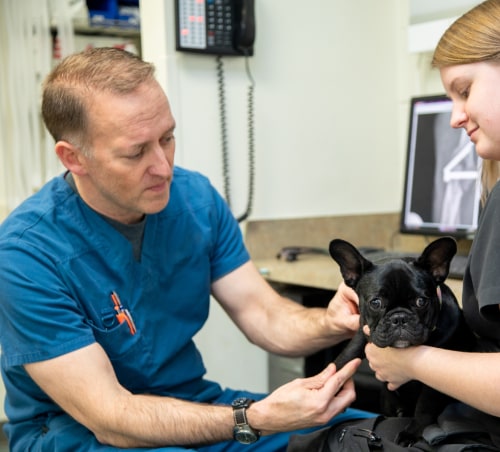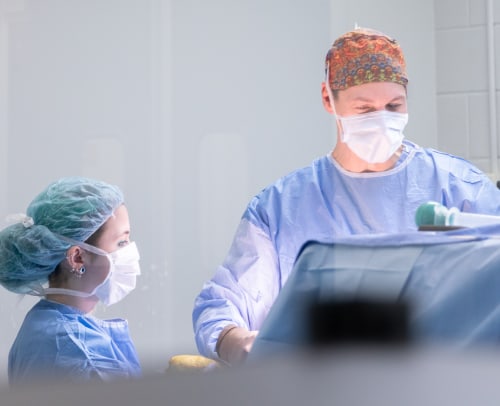Veterinary Surgery in Charlotte
Veterinary Surgical Care for Pets in Charlotte
The board-certified veterinary surgeons at Carolina Veterinary Specialists in Charlotte, make your pet's comfort and safety their priority while performing advanced surgery.
Please Note: We require a referral from your primary care veterinarian before making an appointment for surgery.
Book an Appointment
Our Veterinary Surgical Services
At Carolina Veterinary Specialists in Charlotte, we treat a wide range of orthopedic and soft tissue disorders with comprehensive veterinary surgical treatment options.
Our surgical specialists will perform a detailed exam and, based on your pet’s results, will review additional diagnostic testing options, procedures, risks and expected outcomes with you.
Common veterinary surgical procedures we offer include:
- Total Hip Replacement
- Surgery for Intestinal, Heart & Urinary System Disorders
- Soft Tissue Surgery for Cancer
- Complex Fracture Repair
- Tibial Plateau Leveling (Cruciate Ligament Rupture)
Board-Certified Veterinary Surgeons
To become a specialist, a veterinary surgeon undergoes 4 years of additional training after veterinary school. This training includes a one-year internship and a three-year residency program which meets American College of Veterinary Surgeons (ACVS) guidelines. During this residency, candidates must meet specific training and caseload requirements, and they must pass extensive testing.
What to Expect with Your Pet's Surgery
Your pet is in good hands while in our care. Our every decision is made with designs of post-operative success for your pet.
We believe that knowing what to expect will make the surgery process easier for you and your pet.
- Sterilization Techniques
At Carolina Veterinary Specialists, we adhere to strict sterilization techniques with all of our procedures. Our operating room has positive pressure air flow and, after every procedure, the suite is cleaned and sterilized.
Our surgeons also use sterile prep and wear full surgical attire, including surgical cap and gown and sterile gloves during every procedure.
- Pain Management & Anesthesia
We tailor anesthetic plans to the specific conditions of each of our patients, taking into consideration both lab work and overall cardiovascular health.
We use a multimodal approach — local anesthetic, epidural anesthesia and systemic medications — frequently to ensure your pet is pain free during and after surgery.
- Continuous Patient Monitoring
Using our state-of-the-art monitoring equipment (EKG, end tidal CO2, pulse oximetry, oscillometric blood pressure, arterial line, etc.), we will monitor your pet's vital signs continuously throughout the surgery.
- Post-Operative Care
After your pet's procedure is complete, your veterinarian will contact you to discuss the surgery and next steps.
Depending on the pet's health status and the complexity of the procedure, some pets may be allowed to go home the next day while others may have to stay longer.
We'll provide you with discharge instructions when you arrive to pick up your pet, as well as answer any questions you may have.

